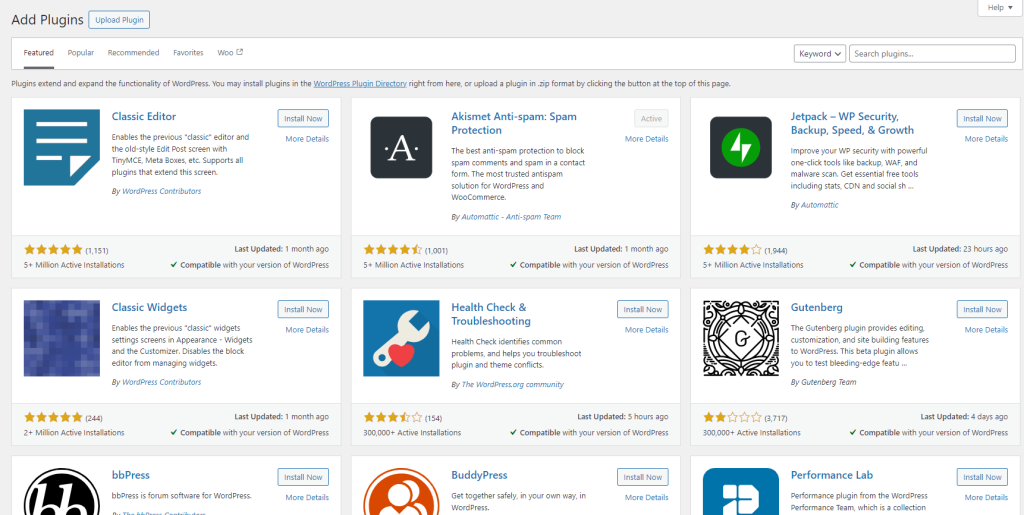WordPress plugins are essential components of a WordPress site, adding new functionality or extending existing features. These plugins are snippets of code that “plug in” to a self-hosted WordPress site, allowing users to customize and enhance their websites without any coding knowledge.
Plugins can range from small tweaks to significant modifications, catering to various needs. Some plugins can transform a WordPress site into a fully functioning eCommerce store, social network, or forum. Others may add smaller features like an Instagram feed or improve site performance and search engine rankings.
To start using WordPress plugins, users need to find a plugin they are interested in and install it on their WordPress site. They can search for plugins directly from their WordPress dashboard, leveraging the extensive WordPress.org plugin directory, Code Canyon, or third-party developer sites.
It is crucial to choose plugins from reputable sources to ensure security, compatibility, and overall site performance. Users should read reviews, check the last update date, and verify the popularity of the plugin before installation.
Installing and Managing WordPress Plugins
Installing a WordPress plugin is a straightforward process. Users can access the Plugins » Add New page in the WordPress dashboard, where they can search for the desired plugin and install it with a few clicks. Once installed, users can activate and configure the plugin to suit their needs.
Updating plugins is vital to maintain functionality and security. Developers regularly release updates, and users can easily update their plugins from the WordPress dashboard. It is recommended to manually update plugins for more control, although automatic updates are also available.
In case a plugin is no longer needed, users can deactivate and uninstall it directly from the WordPress dashboard.

Using Plugins on WordPress.com
While self-hosted WordPress sites (WordPress.org) can benefit from plugins, WordPress.com users have limited access. Previously, only WordPress.com Business Plan users could install third-party plugins, but restrictions still apply to the average WordPress.com user.
Choosing the Right WordPress Plugins
Selecting the right plugins is essential for a successful WordPress website. With thousands of plugins available, it can be overwhelming to decide which ones to use. It is recommended to consider factors such as regular updates, compatibility with the latest version of WordPress, user ratings, and support responsiveness.
Free plugins are a great starting point for beginners or those on a limited budget. As websites grow, users may opt for premium plugins that offer additional features, support, documentation, and regular updates. Premium plugins are especially beneficial for businesses.
Different types of WordPress plugin
WordPress plugins are various tools that play an important role in extending the functionality and versatility of WordPress websites. A prominent category includes SEO plugins such as Yoast SEO and All-in-One SEO Pack, empowering users to optimize their sites for search engines through features such as meta tag customization and content analysis. Security plugins like Wordfence Security and Sucuri Security act as guardians, fortifying websites against malicious activity through firewalls and vulnerability scans. Performance optimization plugins like W3 Total Cache and WP Super Cache increase website speed by implementing caching mechanisms and optimizing various components. Backup plugins like UpdraftPlus and BackupBuddy automate the backup process, ensuring data recovery in the event of a website crash. E-commerce plugins such as WooCommerce and Easy Digital Downloads facilitate the creation and management of online stores by incorporating features such as product listings and secure payment processing. Contact form plugins such as Contact Form 7 and WPForms simplify form creation, enhancing user interaction. Social media plugins, exemplified by Social Warfare and the AddToAny share button, integrate social sharing features, encouraging increased content promotion. Membership plugins such as MemberPress and Restrict Content Pro enable the development of membership sites, control access to certain content, and provide membership-based services. Gallery plugins such as NextGen Gallery and Envira Gallery enhance visual presentation by providing tools for creating and managing image galleries. Together, these plugins empower WordPress users to customize their websites with different features, catering to specific needs and preferences.
Safety and Performance of WordPress Plugins
While WordPress plugins enhance website functionality, safety is not guaranteed. Poorly coded plugins or those from untrustworthy sources can lead to errors, security vulnerabilities, and website slowdowns. It is crucial to choose plugins from reputable repositories or trusted third-party developers.
To enhance website security, users can employ WordPress security plugins like Sucuri, which detect and address security issues promptly.
Concerns about website performance due to plugin overload are valid. While the raw number of plugins is not the sole determining factor, it is advisable to install only necessary plugins to prevent potential performance issues. Striking a balance between functionality and performance is key.
Creating Your Own WordPress Plugin
For those with coding knowledge, creating a WordPress plugin is an option. This requires familiarity with PHP, CSS, HTML, and JavaScript, as well as a local development environment. The WordPress Plugin Directory allows users to share their plugins with others.
Recommended WordPress Plugins
With numerous plugins available, selecting the best ones may seem challenging. WPBeginner offers comprehensive reviews and recommendations for various purposes, including business websites, WooCommerce stores, page builders, SEO optimization, contact forms, and analytics solutions.
Conclusion
WordPress plugins play a vital role in expanding the functionality of WordPress websites. They allow users to customize and enhance their sites without coding knowledge. By installing and managing plugins from reputable sources, users can unlock a wide range of features and improve their site’s performance, security, and user experience. Remember to strike a balance between functionality and performance and regularly update your plugins to ensure optimal website performance.
